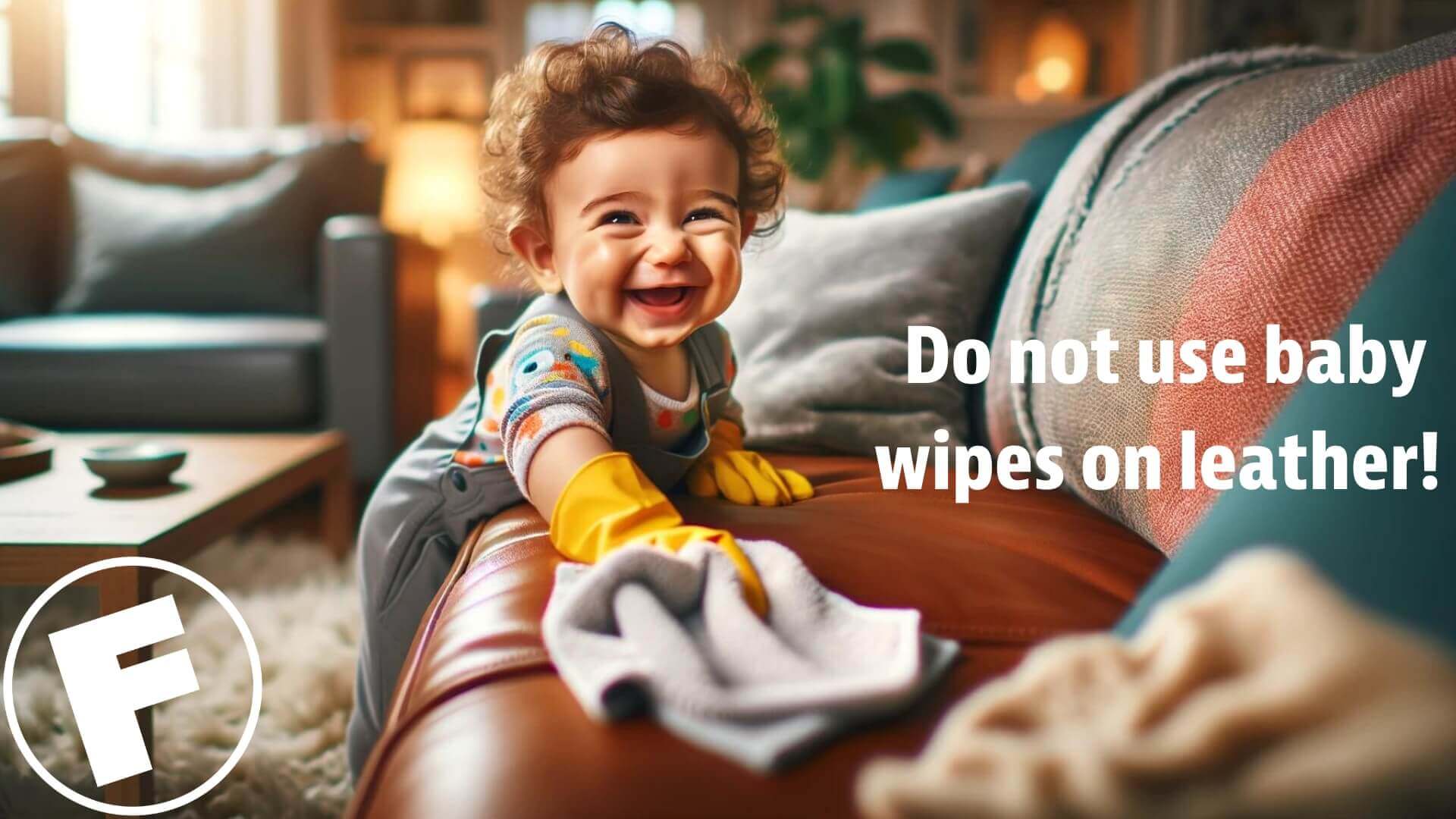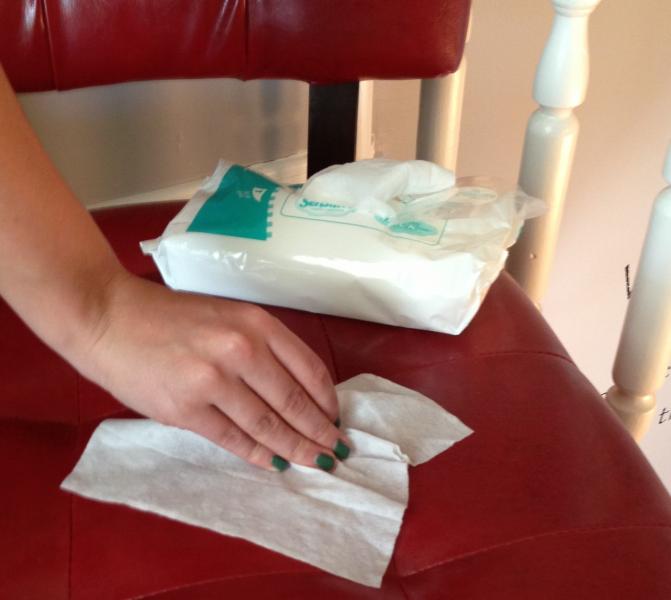Do Not Use Baby Wipes on Leather
When caring for your favorite leather shoes, leather bags, and every other piece of leather, it can be very tempting to use common household cleaning products to maintain that stylish leather finish.
Lots of people gravitate towards products they already have around the house, like baby wipes or other types of cleaning wipes. While these seem like an excellent way to keep your leather upholstery looking clean, they are actually terrible for leather.

There are a number of other home remedies and wives’ tales about using home products on leather. We do not advise using any of the following:
But the culprit of today’s article is baby wipes and other disposable wipes.
Products like baby wipes contain chemicals that can cause the pigment in your leather to peel and crack, completely ruining the finish of your leather products. Nobody likes their leather to look worn down and old!
Protect your leather by avoiding products like baby wipes that contain harsh chemicals.
Why you shouldn’t use baby wipes to clean leather
Whether it’s a classic leather sofa, a stylish jacket, leather seats, handbags, or a luxury car interior, leather products are an investment.
Maintaining leather’s appearance and integrity requires proper care and cleaning techniques. One common misconception is the suitability of baby wipes for cleaning leather surfaces. Although convenient, baby wipes can actually damage leather over time.
This article explores why baby wipes are not suitable for cleaning leather and provides alternative methods to keep your leather items in pristine condition.
The composition of leather
Before diving into the specifics of why baby wipes are harmful, it’s important to understand the composition of leather. Leather is made from animal hides that have been treated through tanning to produce a strong, flexible material. This process preserves the hide, making it more durable than raw skin.
However, leather retains certain characteristics of natural skin, such as the need for hydration and protection from elements.
Leather’s natural properties:
- Hydration: Leather contains natural oils that keep it flexible and prevent it from becoming brittle.
- Porousness: Leather has pores that can absorb liquids and stains, which makes it vulnerable to damage from harsh chemicals.
Why baby wipes are harmful to leather
Baby wipes are designed for cleaning sensitive baby skin, not for cleaning leather. Here are the primary reasons why they are unsuitable for leather care:
Chemical composition
- Harsh Ingredients: Baby wipes contain chemicals like isopropyl alcohol, chlorine, or other synthetic ingredients that can degrade leather’s natural oils.
- pH Imbalance: Leather is naturally acidic, with a pH around 5. Baby wipes, however, are often more alkaline, which can disrupt the balance of the leather, leading to deterioration and cracking.
Moisture content
- Excessive Wetness: Baby wipes are quite moist, which can lead to over-saturation of leather’s pores, weakening its structure.
- Water Stains: Using too much moisture on leather can also leave water stains, especially on lighter-colored or untreated leathers.
Lack of conditioning
- No Nourishing Properties: Baby wipes do not contain conditioning agents suitable for leather. They clean the surface but do not replenish the natural oils lost over time, which are crucial for maintaining leather’s supple texture.
Proper care and cleaning of leather
Maintaining the quality and lifespan of leather goods requires following proper care guidelines. Here are some effective methods and best practices for cleaning and maintaining leather:
Regular maintenance
- Dry Brushing: Use a soft-bristled brush to remove dust and loose dirt before it settles into the leather’s pores.
- Soft Cloth: For light cleaning, use a soft, damp cloth. This can be enough to remove surface dirt without using harsh chemicals.
Appropriate cleaning solutions
- Specialized Leather Cleaners: Choose cleaners specifically formulated for leather. These products are pH-balanced and designed to gently clean without stripping natural oils.
- DIY Solutions: If you prefer homemade solutions, a mix of one part white vinegar with two parts water can serve as an effective cleaner. Always follow up with a conditioner.
Conditioning
- Leather Conditioner: After cleaning, apply a leather conditioner to restore moisture and flexibility. This helps prevent cracks and keeps the leather looking new.
- Regular Application: Conditioning every three to six months can dramatically extend the life and appearance of leather.
Avoid direct heat and sunlight
- Prevent Fading: Keep leather furniture away from direct sunlight and heat sources to prevent fading and drying out.
Professional care
- Complex Stains: For tough stains or extensive damage, consult a professional leather specialist rather than attempting to resolve the issue with household products.
Fibrenew is your go-to for leather care and restoration
While baby wipes might seem like a convenient option for quick cleaning, they are not suitable for leather care. Using these wipes can lead to damage and a shortened lifespan for your leather items.
Get in touch with your local Fibrenew professional for all your leather, plastic, and vinyl repair needs.
Want to run a business that gives you incredible earning potential and the flexibility to take control of your time and life? Join the Fibrenew Family!
Check out our free Franchise Information Report for everything you need to know.
Also, enjoy these valuable resources on all things leather, plastic, and vinyl repair, franchising, sustainability, and more:
Baby wipes on Leather FAQ
What are baby wipes typically made of?
Baby wipes are designed to be gentle enough for a baby’s skin and contain various ingredients such as moisturizers, lotions, and mild detergents. They often contain alcohol or other chemicals that can be harmful to leather.
Why can’t I use baby wipes to clean leather?
Leather is a natural material that requires specific care to maintain its appearance and durability. Baby wipes contain chemicals that can degrade leather by stripping away natural oils, leading to dryness and cracking. The pH of these wipes often does not match the natural acidity of leather, causing further imbalance and deterioration.
What happens if I use baby wipes on leather?
Using baby wipes on leather can cause several issues:
- Drying Out: The chemicals in baby wipes can remove the essential oils in leather, causing it to become dry and brittle.
- Cracking: As the leather dries out, it becomes less flexible and more prone to cracking.
- Discoloration: Some ingredients in baby wipes can react with the leather dye, leading to fading or uneven color.
- Buildup: Residues from the wipes can accumulate on the surface of the leather, attracting more dirt and grime.
Can I use baby wipes on faux leather?
While faux leather is more durable against certain chemicals, it is still best to avoid using baby wipes. Faux leather can also react negatively to the harsh chemicals in baby wipes, leading to similar issues as with genuine leather.
What should I use instead of baby wipes to clean leather?
To safely clean leather, use products specifically designed for leather care. These include:
- Leather cleaner: Formulated to clean effectively without damaging the leather.
- Damp cloth: A lightly dampened cloth can remove surface dirt and dust without introducing harmful chemicals.
- Leather conditioner: After cleaning, applying a leather conditioner can help restore moisture and protect the leather from future damage.
How often should I clean and condition my leather items?
Regular maintenance is key to extending the life of leather. Clean your leather items gently every few months or as needed when dirt appears. Condition leather every 3 to 6 months, depending on the item’s exposure to wear and environmental factors.
What’s the best way to remove stains from leather?
For stains, it’s advisable to use a cleaner specifically designed for leather. Gently dabbing the stain with a damp cloth and leather cleaner, rather than rubbing, can help prevent further damage. For persistent or difficult stains, consult a professional leather cleaner.
Can professional cleaning services help if I’ve already used baby wipes on my leather?



